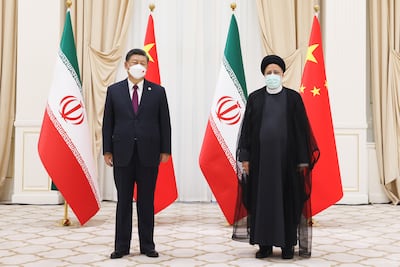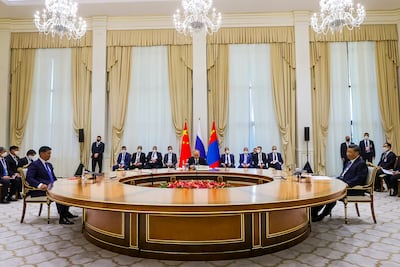Chinese President Xi Jinping met his Iranian counterpart Ebrahim Raisi on Friday, with the two leaders holding their first face-to-face discussions.
The meeting took place on the sidelines of the Shanghai Co-operation Organisation summit in Samarkand, Uzbekistan.
Mr Xi said the two countries had a “long-standing friendship” and that their ties had “stood the test of a changing international landscape”, state news agency Xinhua reported.
The Chinese leader also said Beijing was “ready to increase strategic communication and co-ordination” with Tehran to improve ties.
Mr Xi said he stood with Iran on “non-interference in internal affairs”.
Iran is currently negotiating a return to the 2015 nuclear deal, which it said should not allow “foreign elements” to interfere in its affairs.
“China will continue to take a constructive part in the negotiations on resuming the implementation of the Joint Comprehensive Plan of Action and support Iran in safeguarding its legitimate and lawful rights and interests,” Mr Xi said, according to Xinhua.
He also supported Iran's push to become a full member of the Shanghai Co-operation Organisation.
Mr Raisi said organisation could help in the fight against US “unilateralism” and called for the expansion of its membership.

The Chinese leader also met Turkish President Recep Tayyip Erdogan on the sidelines of the meeting, state media said.
During the summit, Indian Prime Minister Narendra Modi called on leaders within the organisation, including Russia and China, to address the energy and food crises sparked by the Covid-19 pandemic and the Ukraine conflict.
“The pandemic and the crisis in Ukraine have caused many disruptions in global supply chains, leaving the world facing unprecedented energy and food crises,” Mr Modi said on Friday.
“[The] SCO should strive to develop reliable, resilient and diversified supply chains in our region.”
Other than India, China and Russia, other members include Pakistan, Kazakhstan, Kyrgyzstan, Tajikistan and Uzbekistan.
Iran, one of the organisation's four observer states, applied for full membership in 2008 but its bid was affected by UN and US sanctions imposed over its nuclear programme.
China is one of the key members of the multilateral dialogue — alongside France, Germany, Britain, Russia and the US — that is trying to revive Iran's troubled 2015 nuclear deal.

Xi and Putin meet
Meanwhile, Mr Xi told Russian President Vladimir Putin on Thursday the two countries could “inject stability” into the world as the pair held their first face-to-face talks since Russia invaded Ukraine.
The meeting with Mr Putin was part of Mr Xi's first trip abroad since the early days of the Covid-19 pandemic.
“China is willing to make efforts with Russia to assume the role of great powers, and play a guiding role to inject stability and positive energy into a world rocked by social turmoil,” Mr Xi told Mr Putin.
He said China was willing to work with Russia to support “each other's core interests”, CCTV reported.
In a clear swipe at the US, Mr Putin said “attempts to create a unipolar world have recently acquired an absolutely ugly form and are completely unacceptable”.
“We highly appreciate the balanced position of our Chinese friends in connection with the Ukrainian crisis,” he told Mr Xi, while repeating Moscow's backing for China on Taiwan.
“We adhere to the principle of one China. We condemn the provocation of the US and their satellites in the Taiwan Strait,” Mr Putin said, after a US Senate committee on Wednesday took the first step aimed at directly providing billions of dollars in American military aid to Taiwan.
It was the first in-person meeting between the two leaders since they met in early February at the Winter Olympic Games, days before the Russia invaded Ukraine.














